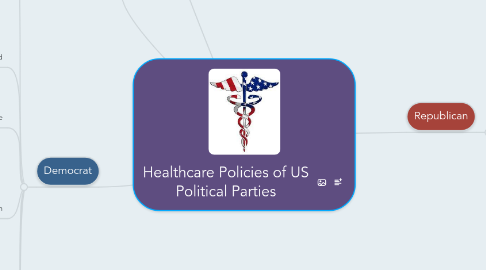
1. Democrat
1.1. Affordable Care Act
1.1.1. The US is the only industrialized nation without universal health care (McKee, 2017)
1.1.2. Healthcare costs are highest and outcomes are poor compared to other countries (McKee, 2017,
1.1.3. Key Tenets (Obama, 2016)
1.1.3.1. Expanding and Improving Coverage
1.1.3.1.1. Medicaid expansion
1.1.3.1.2. Financial penalties for being uninsured
1.1.3.2. Reforming Health Care Delivery
1.1.3.2.1. Move towards alternative payment models
1.1.3.2.2. Move from fee for service to incentive/quality based payment models
1.2. Medicaid
1.2.1. Federal support for Medicaid expansion
1.2.1.1. Must meet federal minimum guidelines and outline a plan to expand Medicaid beyond federal minimums.
1.3. Medicare
1.3.1. Focus is on alternative payment structures and incentive programs to achieve triple aim: Better care, Better quality, Reduced costs
1.3.1.1. Many federal mandates to achieve Triple Aim (e.g. penalty for 30 day readmission)
1.4. Medicare Penalty for 30 day readmission
1.4.1. 30 day readmissions were reduced by about 2% resulting in 565,000 fewer admissions (Obama, 2016)
1.5. Effect of the Prospective Payment System on Anemia Management in outpatient dialysis
1.5.1. Has driven care in non-evidenced based direction
1.5.1.1. Increased IV iron use (no evidence of improved outcomes) (Charytan, 2015)
1.5.1.1.1. Serum ferritin upper limit increased (very limited evidence) (Karaboyas, 2015).
1.5.1.2. Transfusion rates have increased (Wetmore, 2016)
1.6. Financing Ideology and Concerns: Current and Future
1.6.1. Current: Goal is to invest in healthcare coverage to ultimately reduce total costs of care. This requires large up from investments which Republicans do not support.
1.7. Stakeholders
1.7.1. Democrats and Liberals
1.7.2. Americans currently eligible for Medicaid and Medicare
1.8. Major ACA Proponent: Se. Elizabeth Warren
1.8.1. Supports women's health initiatives
1.8.2. Opposes privatizing Medicare and voucher programs
1.8.3. Opposes repealing the ACA
2. My View: From a Pharmacist Practicing for the last 20 years
3. References
4. Republican
4.1. Affordable Care Act
4.1.1. Critics: ACA has costly mandates that drive up costs and puts the federal government between doctors and patients
4.1.1.1. One proposed alternative: Patient Choice, Affordability, Responsibility and Empowerment (CARE) (McCarthy, 2015).
4.1.1.1.1. Halts Medicaid expansion, cuts subsidies for low/middle income people purchasing insurance, reduces regulation of the insurance industry
4.2. Medicaid
4.2.1. Medicaid Expansion
4.2.1.1. Party generally agrees that Medicaid should not be expanded
4.2.1.1.1. Data suggest that although rates of having "any insurance went up, there was a trend toward reduced individual purchased insurance (Soni, 2017)
4.2.1.1.2. One study has shown that high users of Emergency Department visits for ambulatory care (chronic) conditions has not been reduced since ACA (Gingold, 2017)
4.3. Medicare
4.3.1. Although the party generally supports Medicare in concept, there have been initiatives proposed by House Republicans to repeal Medicare. They suggest replacing it with a voucher program which covers some of the plan costs. It is predicted to increase beneficiary's out of pocket by up to 40%.
4.4. Penalty for 30 day readmission
4.4.1. Few hospitals have been able to achieve the 30 day readmission benchmark. 77% of hospitals faced readmissions penalty (2% reduction in Medicare reimbursement) in 2016.
4.5. Effect of the Prospective Payment System on Anemia Management in outpatient dialysis
4.5.1. This has generally not been a partisan issue. However, any Medicare reform has the potential to greatly impact dialysis conditions for coverage (Medicare Program, CMS, 2016)
4.6. Financing Ideology and Concerns: Current and Future
4.6.1. Current: Republicans see the ACA, Medicare and Medicaid as dysfunctional and costly (Baker, 2017)
4.6.2. Future: Conservatives want to put Medicaid programs back into the hands of the states via grant programs. The want to scale back on the expanded coverage groups (people with incomes up to 138% of the poverty level) (McCarthy, 2015)
4.7. Stakeholders
4.7.1. Republican politicians at state and federal levels
4.7.2. Private sector health insurance companies
4.7.2.1. Reduction of their metrics for quality of care
4.7.3. 20 million people currently insured by ACA
4.8. Major ACA Opponent: Tom Price
4.8.1. Medicare: wants to end fee for service. Give recipients a voucher to buy their own insurance on the private market
4.8.2. Opposes "outcomes" based physician reimbursement
4.8.3. Medicaid: Against expansion. Supports Block grants to states to manage their own Medicare programs. Would restrict coverage.
